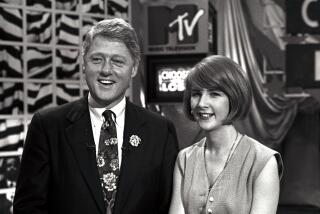They Paved the MTV Way
- Share via
The five of them first showed up on a ragged network of TV screens almost 10 years ago, behind a rocket ship blasting off into space and an obscure British rock group, the Buggles, singing “Video Killed the Radio Star.” They called themselves veejays-video jockeys. Critics called them talking heads and said they knew nothing about rock ‘n’ roll.
But the original veejays-Mark Goodman, Martha Quinn, J.J. Jackson, Alan Hunter and Nina Blackwood-publicly predicted: “You will never look at music the same way again.” And they were right.
MTV Music Television, the all-music cable channel that put veejays on the air, exploded into a pop culture phenomenon that within its first decade has changed the direction of music and movies, TV and radio, art and attitudes.
Beginning Saturday, the original veejays reunite to host an MTV weekend of special programming. The group recently congregated in MTV’s Los Angeles offices, around a conference table of pizza and Cokes, to recall the dawning of music television on Aug. 1, 1981.
“That first year we weren’t on in New York or Los Angeles,” said Quinn, 31, who came to MTV straight out of New York University. “We were in, like, Fargo, N.D.”
“Tulsa, Okla., was a big market for us,” Goodman said.
“And Ft. Lee, N.J.,” Quinn added.
“It was very odd to me,” said Jackson, 44, who had the most experience of the veejays with 14 years in Los Angeles radio. “Radio was getting very conservative then. So here we were on MTV playing bands like Pauline Black and the Selecter. To think that in Los Angeles they weren’t hip to what was going on in English rock, and yet in Fargo they were right on top of it.”
At times, however, there was doubt whether MTV would ever lift off the ground, as its man-on-the-moon logo suggested. One would-be original veejay, whom -uinn replaced, never even made it on the air because the pressure was so great.
When MTV did expand into larger markets, the veejays suddenly found themselves the object of intense media scrutiny and skepticism.
“Rolling Stone hated us,” said Goodman, 37, who was formerly a popular New York deejay. “Kurt Loder at Rolling Stone used to tear us up in every stupid article he wrote. He’d be reviewing a record, and he’d find a way to slam MTV.” (Loder now reports music news on MTV.)
“But the public clicked into MTV that fast,” Goodman said, snapping his fingers. “The press was saying we had a bad attitude and were blissfully ignorant of rock. In the meantime, Americans were looking to the five of us for their music information.”
There was even resistance from established rock groups. Said Quinn: “I remember when Bruce Springsteen made his first video (of the song “Atlantic City” on the 1982 “Nebraska” album), but he was too cool to be in it. So it was kind of a nod to MTV, but it wasn’t.”
To enhance their credibility, the veejays used to sit around together for hours watching videos and reading rock literature. “We were together nonstop for five years,” Quinn recalled. “We used to all take one rent-a-car to the Meadowlands. Before we were allowed limousines, we would all cram into our Nova and drive out to see a Judas Priest concert.”
“The first night MTV aired, we had taped all day in New York and we took a school bus to New Jersey to watch its launch,” Goodman said.
“We were standing in this cheesy little banquet room in a bar and restaurant somewhere in Ft. Lee,” Hunter said.
“When Mark first went on,” Jackson said, “you know, we all teared up. And I remember Mark looking at me and saying: ‘This is going to be the beginning of a revolution.”’
Of course, he was right. In later years the veejays would jet around the world to cover concerts and interview musical superstars, and MTV would eventually reach more than 110 million households in 33 countries.
“The nature of the beast grew so slowly that we didn’t have time to be overnight successes,” said Hunter, 33, an actor who used comedy to mask what he didn’t know about rock music.
“We were all such good friends, there was no star-tripping or ego-tripping. Studio tours would walk down the hall and see me ironing my shirt, because, you know, my damn shirt was wrinkled. People would poke their head in and say, ‘Golly, lookee there, maw. He’s ironing his own shirt!’ And I’d say, ‘Yeah, after this I’m doing Martha’s skirt, now get the hell out of here.”’
Beginning in 1986, one by one, the original, hometown veejays were replaced in an MTV changing of the avant-guards. Today, all the original veejays live in Los Angeles. Hunter hosts Fox Television’s “Haywire.” Goodman, a KROQ-FM deejay, also acts. Jackson works as a radio consultant. -uinn is back on MTV veejaying a classics show. And Blackwood hosts a syndicated rock TV show and two radio shows.
“When someone asks, ‘What was the best thing about it?’ I say, TThe best thing was that we were the first,”’ Hunter said. “We were the pioneers of something that became a giant, and we wrote the book that others will follow. Nobody can ever take that from us.”
MTV’s “Reunion Weekend” begins Saturday at 10 a.m.
More to Read
The biggest entertainment stories
Get our big stories about Hollywood, film, television, music, arts, culture and more right in your inbox as soon as they publish.
You may occasionally receive promotional content from the Los Angeles Times.










